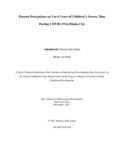| dc.contributor.advisor | Mehnaz, Ashfi | |
| dc.contributor.author | Sattar, Humyra Zarin | |
| dc.date.accessioned | 2022-03-03T05:36:46Z | |
| dc.date.available | 2022-03-03T05:36:46Z | |
| dc.date.copyright | 2021 | |
| dc.date.issued | 2021-12 | |
| dc.identifier.other | ID 20155006 | |
| dc.identifier.uri | http://hdl.handle.net/10361/16387 | |
| dc.description | This thesis is submitted in partial fulfilment of the requirements for the degree of Masters of Science in Early Child Development, 2021. | en_US |
| dc.description | Cataloged from PDF version of thesis. | |
| dc.description | Cataloged from PDF version of thesis. | |
| dc.description | Includes bibliographical references (pages 37-45). | |
| dc.description.abstract | Digital devices, such as phones, computers, television, tab worldwide enlarged, and in Bangladesh scenario is indifferent. Based on international studies and study findings children who are involved in digital screens more than any other physical activity become more inactive in their life. Many countries approach many strategies for maintaining these issues but unfortunately in Bangladesh is still far behind in making any steps. Moreover, educated parents are ignorant about the consequences of screen time, as a result, the situation gets worse. Also during the data collection, it has been found that parents are occupied with their work most of the time which does not let them focus on their children, and the other hand children are stuck at home during a pandemic, so digital devices become the only options for them. Mainly the increased situation of screen time, parents lack of knowledge, and the need for investigation on this issue in the context of Bangladesh, the current study was to examine parental perceptions of screen time and what kinds of practices they are following to control these issues among 3 to 6 years children in Dhaka city. For this study, data were collected through the qualitative method and followed a semi-structured interview questionnaire for both fathers' mothers' in-depth interviews. The study was on purposive sampling, where four mothers and 2 fathers from diverse socio and academic backgrounds participated. In this respect, the study indicated that though all the parents are educated and have good knowledge of on-screen time they have lack knowledge of the negative effects of screen time and all blame their busy work schedule which does not let them do much control this issue. Most of the parents believe in a day 2 or 3 hours of screen time are fine. No parents apply any strict rules or limit the time frame for screen time. Ents recommended having a safe play zone in the society might help t control this problem. | en_US |
| dc.description.statementofresponsibility | Humyra Zarin Sattar | |
| dc.format.extent | 49 pages | |
| dc.language.iso | en | en_US |
| dc.publisher | Brac University | en_US |
| dc.rights | BRAC University thesis reports are protected by copyright. They may be viewed from this source for any purpose, but reproduction or distribution in any format is prohibited without written permission. | |
| dc.subject | Parental perception | en_US |
| dc.subject | Screen time | en_US |
| dc.subject | Dhaka city | en_US |
| dc.subject.lcsh | Television and children. | |
| dc.subject.lcsh | Behavior of children | |
| dc.title | Parents perceptions on 3 to 6 years of children’s screen time during COVID-19 in Dhaka city | en_US |
| dc.type | Thesis | en_US |
| dc.contributor.department | Institute of Education Development, BRAC University | |
| dc.description.degree | M. Early Child Development | |

